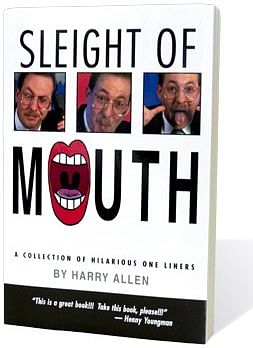Sleight Of Mouth by Harry Allen
Reviewed by Jamy Ian Swiss (originally published in Genii October, 2005)

What's wrong with this book:
(1) A list of contributors in the front of the book, an obvious attempt to help deflect
attacks for lack of crediting—the kinds of attacks that have been leveled at the author's
previous pamphlets—serves poorly, if at all, as a defense. Had the names of those
contributors been attached to specific entries, then perhaps we could judge the accuracy
and ownership of their "contributions." Even presuming such ownership was accurate,
this brief list does not seem to begin to account for the volume of work included here.
The problem, in a word, is theft. Collecting and using jokes you like from random acts of
performance is a focused act of piracy and is inexcusable; collecting and publishing
them without explicit permission is indefensible. (A joke about using one's powers only
for good—since stolen by countless magicians—was likely the creation of Emo Phillips.
Suggesting that it's nice to have a nose large enough for birds to perch predates Jimmy
Durante—try Edmond Rostand in 1897. But you get the idea.)
(2) Much of the material in these pages is in such bad taste it might as well have been
written by Jack Kevorkian; using some of these lines in public might well serve as a
practical and immediate course in suicide. For the lines that the audience won't kill you
for, there are countless others that any user deserves instant vaporization for uttering,
considering the wealth of insulting and offensive material included here. A performer
would have to be working exclusively for idiots, and noxious ones at that, to find many
of these lines appropriate; he'd have to be an idiot himself to utter them under all but
the most egregious of conditions.
(3) Nobody who's interested in learning to be professionally funny will be able to do so
with a book like this as a source. Being funny means creating original humor that suits
your character and reflects your point of view, not plugging in someone else's material,
whether good or bad, like selections from a Chinese menu. If you want to learn to
actually be funny, try a serious book like How To Write & Sell Your Sense of Humor, by
Gene Perret (1982, Writer's Digest Books).
(4) It's not funny.
What's right with this book:
(1) Unknown.
It's not the author's material. It's not your material. Don't do it. Don't buy it.
For further discussion of these and other related issues, I yield the floor to professional
comedy star Paul Provenza. See my interview with Paul on the next page.

